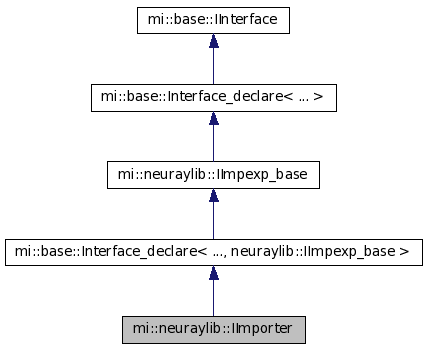mi::neuraylib::IImporter Class Reference
[Importer and Exporter]
Description
Abstract interface for importers.
Public Member Functions
- virtual IImport_result* import_elements( ITransaction* transaction, const char* extension, IReader* reader, const IMap* importer_options, IImpexp_state* state) const =0
- Imports a scene via a reader. More...
- virtual bool test_file_type( const char* extension, const IReader* reader) const =0
- Indicates whether the importer can handle the file type. More...
Member Functions
- virtual IImport_result* mi::neuraylib::IImporter::import_elements( ITransaction* transaction, const char* extension, IReader* reader, const IMap* importer_options, IImpexp_state* state) const [pure virtual]
-
Imports a scene via a reader. Imports all elements from the reader in a format determined by the file extension and (optionally) the lookahead of the reader.
In addition to importer specific options, every importer has to implement the following standard options:
-
"prefix" of type mi::IString: This prefix is to be prepended to the names of all imported elements. Default: the empty string.
-
"list_elements" of type mi::IBoolean: If true, the name of each imported element has to be stored in the returned instance of mi::neuraylib::IImport_result (e.g. via mi::neuraylib::IImport_result_ext::element_push_back()). Default: false.
It is strongly recommended that names for importer specific options use a prefix related to the importer to avoid name conflicts, e.g., the file name extension.
Parameters
- transaction
- The transaction to be used.
- extension
- The file name extension (which might influence the file format).
- reader
- The reader to read the byte stream from.
- importer_options
- The options that control the way the importer works (optional).
- state
- The current importer state.
Returns
An instance of mi::neuraylib::IImport_result indicating success or failure.
-
- virtual bool mi::neuraylib::IImporter::test_file_type( const char* extension, const IReader* reader) const [pure virtual]
-
Indicates whether the importer can handle the file type. Returns true if the importer can handle the file type determined by the file name extension or by looking at the lookahead. The extension is defined as the part of the file name after and including the first dot, for example, ".mi". This method also checks if the reader has sufficient capabilities to import successfully. If not, the importer shall return false immediately.
For formats that have a mandatory and sufficiently distinguishing magic header, the importer shall use an available lookahead to determine the answer. Otherwise, the importer shall use the file name extension. In addition, if the lookahead is available the importer may check if the file header is plausible. If the file header is not understood by the importer, it should return false.



